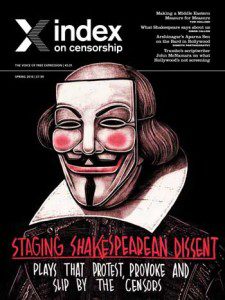Staging Shakespearean Dissent: plays that protest, provoke and slip by the censors

Order your copy of the spring issue of Index on Censorship here.
Saturday 23 April marks the 400th anniversary of Shakespeare’s death. The Bard’s work has long been used to tackle difficult or controversial issues; issues that most often only received an audience due to the cloak of his respectability. To honour the occasion Index has put together a list of all things Shakespeare.
Shakespeare special report
Shakespeare and his role in protest and dissent is the theme of the spring 2016 issue of Index on Censorship magazine: Staging Shakespearean Dissent; Plays That Protest, Provoke and Slip by the Censors. The issue features pieces that explore how the bard’s plays have been used to circumvent censorship and tackle difficult issues around the world; from Bollywood adaptions to Othello in apartheid-era South Africa and a ground-breaking recent performance of Romeo and Juliet between Kosovan and Serbian theatres, along with reports on theatre upsetting people in the USA, and interviews with directors around the world
How Shakespeare’s plays smuggle in protest
Index on Censorship magazine editor Rachael Jolley introduces our Shakespeare special issue with her editorial piece, How Shakespeare’s plays smuggle protest. In this piece Jolley discusses how the work of “established” or “historic” playwrights gave actors the chance to tackle themes that would otherwise never be allowed.
Simon Callow: Plays, protest and the censor’s pen
Shakespeare was no stranger to censorship, from the Elizabethan to Jacobean police states. In this extract actor and theatre director Simon Callow looks at how his plays amused monarchs and dictators but also prompted their anger.
My Mate Shakespeare
My Mate Shakespeare recasts the playwright as a brandy loving bingo addict, struggling in a war zone. The poem, which was published in the spring issue of Index on Censorship magazine, was written by poet Edin Suljic following a visit to his home country, Former Yugoslavia. The issue also features an interview with the poet, who fled to London in 1991 ahead of the country’s impending war, discussing his inspiration for the poem and his involvement with theatre group Bards Without Borders.
Quiz: Are you a Shakespeare expert?
How well do you know Shakespeare? Take our quiz and see how much you know about the Bard and his work.
Student reading list: theatre and censorship
The theatre and censorship reading list is a compilation of articles from the magazine archive covering theatre censorship across the world. From the censorship of Romeo and Juliet in US high school textbooks to Janet Suzman’s controversial production of Othello in apartheid-era South Africa, to the banning of performances of Macbeth in actors’ homes in Czechoslovakia.
Ben Jennings: Modern Shakespearean imagery
In an interview with magazine editor Rachael Jolley an award-winning cartoonist, Ben Jennings, discusses his design for the latest Index on Censorship magazine cover on the 400th anniversary of William Shakespeare’s death.
A global guide to using Shakespeare to battle power
Hitler was a Shakespeare fan; Stalin feared Hamlet; Othello broke ground in apartheid-era South Africa; and Brazil’s current political crisis can be reflected by Julius Caesar. Across the world different Shakespearean plays have different significance and power. In our global guide to using Shakespeare to battle power some of our writers talk about some of the most controversial performances and their consequences.
Order your full-colour print copy of our Shakespeare magazine special here, or take out a digital subscription from anywhere in the world via Exact Editions (just £18* for the year). Each magazine sale helps Index on Censorship fight for free expression worldwide.
*Will be charged at local exchange rate outside the UK.
Magazines are also on sale in bookshops, including at the BFI and MagCulture in London as well as on Amazon and iTunes. MagCulture will ship anywhere in the world.

